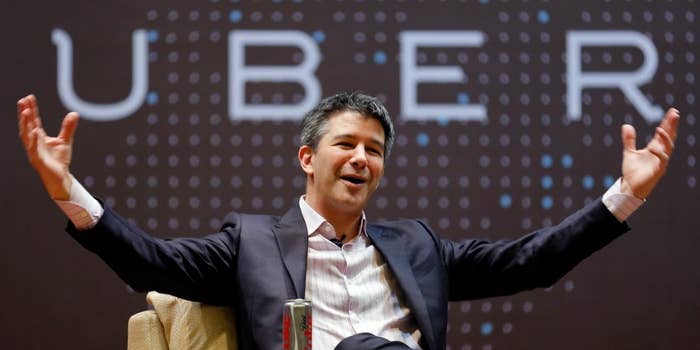
Whether to keep Travis Kalanick as CEO of Uber, amid an ever-expanding controversy, isn’t up to his fellow board members. It’s up to Travis Kalanick.
During a call with reporters on Tuesday, Arianna Huffington, the media entrepreneur who sits on Uber’s board, answered a question about whether the board had considered asking Kalanick to step down as chief executive amid a proliferation of scandals that includes — in no particular order — accusations of systemic sexism, a nasty customer revolt against Kalanick's decision to join President Trump’s economic advisory council, allegations of trade secret theft, claims that the company used one of its logistics tools to evade law enforcement, and Kalanick’s embarrassing public admission that he needs to seek “leadership help” and “grow up.”
Huffington’s response was definitive and perfunctory. “It’s not something that’s been addressed,” she replied. “We don’t expect it to come up.”
Uber’s board may profess to have full confidence in Kalanick, but it likely has little recourse to do otherwise. Kalanick, cofounder Garrett Camp, and Ryan Graves — the company’s first employee — each hold a significant number of so-called super-voting shares, which carry 10 votes per share, according to sources and Uber’s articles of incorporation.
Together, the trio controls as many as nine of the company's 11 board seats, according to The Information, making the minority of independent directors essentially powerless. If Kalanick were to step down, it would have to be of his own volition. And as Huffington said, that's not something the board expects to come up.
Uber declined comment.
"If he controls the votes to replace the board, it’s pretty unlikely he would be replaced by the board."
Charles Elson, a professor and director of the University of Delaware’s John L. Weinberg Center for Corporate Governance, said that at private companies like Uber, board members are more like advisers than monitors of behavior.
“Put it this way,” he said. “If he controls the votes to replace the board, it’s pretty unlikely he would be replaced by the board. If they disagree, they just leave. You got the votes, you do what you wish.”
In February, Uber investors Mitch and Freada Kapor wrote in an open letter to Uber’s board that they were “frustrated and disappointed” in the company. “We feel we have hit a dead end in trying to influence the company quietly from the inside,” they wrote.
"Can Travis stay as CEO? I really haven't had any significant discussions with investors in Uber on that subject,” Mitch Kapor told BuzzFeed News earlier this month.
Kapor attributed the lack of discussion on the topic to the idea that Kalanick has proven in his time as Uber’s CEO that he can “revolutionize urban transportation globally.”
"He's already done something that nobody thought he could do. That suggests he has special capabilities,” Kapor told BuzzFeed. “So then the question is, does he get engaged in a sustained way about his self-transformation and a transformation of the culture?”
It's not unheard of for a well-funded Silicon Valley startup to replace its CEO amid scandal. In early 2016, Zenefits, the prominent human resources startup, faced a regulatory crisis so severe that the board moved to oust the founding CEO, Parker Conrad. But the details of that episode help illustrate why such a parting of ways is so unusual.
"Can Travis stay as CEO? I really haven't had any significant discussions with investors in Uber on that subject."
Like Kalanick at Uber, Conrad had an iron grip on Zenefits. Though he had received funding from powerful venture capitalists, he still controlled three of the four seats on Zenefits' board, making it virtually impossible for him to be fired. So even when others at the company recognized that Zenefits faced potentially serious legal and financial trouble, Conrad could dictate the terms of his own departure.
Unlike Uber, Zenefits had a powerful No. 2 executive in David Sacks, who had joined about a year before the scandal erupted, and who led the effort to remove Conrad, according to people familiar with the matter. But Sacks's power was limited, and he had to make a case to Conrad about why the company — and Conrad's sizable stake in it — would be better off without him. Between the time when Conrad verbally agreed to resign and when he actually signed the separation agreement, Sacks feared Conrad might change his mind, according to people familiar with Sacks's thinking.
Conrad, with maximum leverage, was able to secure several sweeteners from Zenefits as conditions of his departure. In addition to keeping his Zenefits shares, he got a $130,000 severance payment and was permitted to keep unvested stock that would vest over the subsequent six months, BuzzFeed News has reported.
Later, Bloomberg News reported that Conrad regretted resigning, underscoring his awareness that the decision to leave was ultimately his alone.
On the conference call with reporters, Huffington outlined the company’s plan to “make Uber the most admired place to work in” and said she is a “big believer in people, leaders, companies being allowed to evolve.”
“I have seen personally Travis’s evolution,” she said. “It’s clear that both Uber and the ride-sharing industry would not be where we are today without Travis.”
Mitch Kapor struck a less conclusive tone as to whether Kalanick, a brash CEO who led the company through its regulatory battles worldwide and to its nearly $70 billion valuation, could bring Uber stability and change its culture.
“I don't think it's impossible,” Mitch Kapor said, but “I think the odds are against it."

